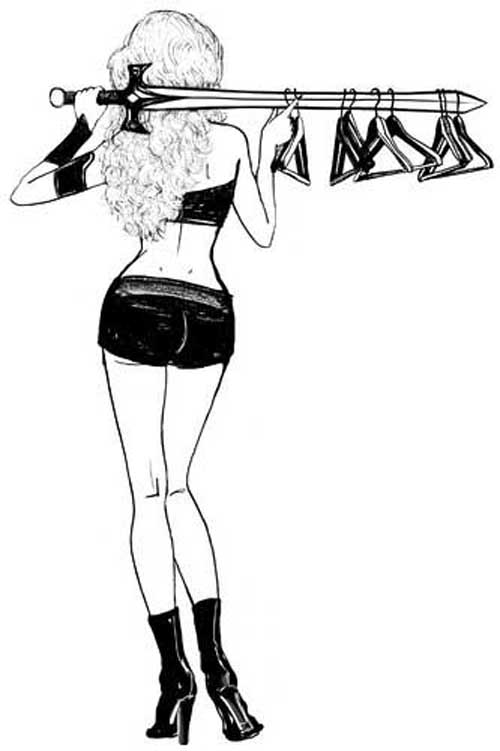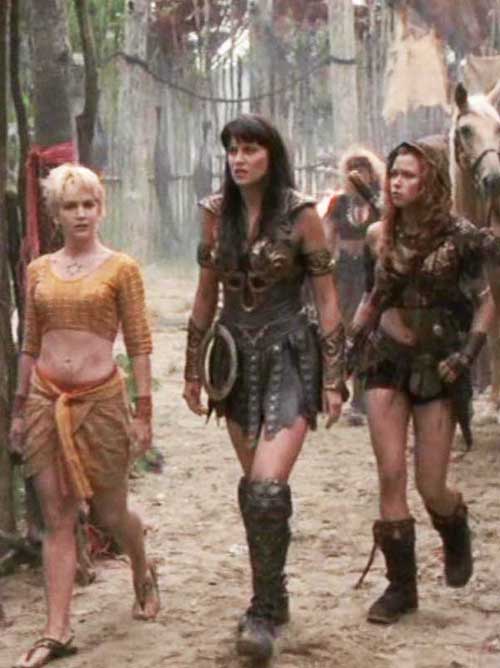SOLIDARITY FOREVER: A new take on 'Fashion Week'... Even Warrior Princesses need a union... 'Zena' carried a union card and the song is now a far cry from the 'organize the guys' years of the classic union song 'Union Maid'
Fans of the famous feminist stories of the past 20 years might remember the shortened James Cameron show "Dark Angel," which launched the career of Jessica Alba as a genetically modified kick-ass rebel against the one percent in a dystopian Seattle of the 21st Century. Others in that genre included "Buffy Vampire Slayer"and "Zena Warrior Princess." All of the feminist classics of that era featured young, strong, agile, and ethical women standing up against -- well, evil.
 Graphic that appeared in the print editions of The New York Times on September 10, 2013 with this article.Although it was not noted on Labor Day, one of the reasons why such shows became possible was unions. That was noted, in an Op Ed in The New York Times of September 10, 2013, by one of the actors who worked -- and acting is work -- in "Zena."
Graphic that appeared in the print editions of The New York Times on September 10, 2013 with this article.Although it was not noted on Labor Day, one of the reasons why such shows became possible was unions. That was noted, in an Op Ed in The New York Times of September 10, 2013, by one of the actors who worked -- and acting is work -- in "Zena."
NEW YORK TIMES OP ED, SEPTEMBER 10, 2013....
OP-ED CONTRIBUTOR. My Life as a Warrior Princess. By JENNIFER SKY. Published: September 9, 2013
EVERY time Fashion Week returns to the city, the subways crowded with long-legged adolescents with stylish shoes and wary eyes, I can’t help but think about myself at age 14. That’s how old I was when I started working in the fashion industry.
I had wanted to go new places, to try bold new things. But I soon learned that this was a world where young women’s rights were worth less than the clothing they wore. In Italy, I was hired for a bathing suit shoot. The photographer made me stand in a freezing pool for hours, then screamed in my face when my skin turned an unattractive shade of blue. In Mexico, I was given drugs, then coerced into going topless for a shoot. I learned the hard way that my body was not my own.
I felt powerless, and after just a few years, I wanted out. So I found myself, at 17 in 1994, sitting on the floor in a corner of the Wilhelmina modeling agency, reading a pilot script for the first season of the television show “Xena: Warrior Princess.” I remember being excited by this incredible land of make-believe, a land where women ruled.
I auditioned for the role of Gabrielle, a farm girl who becomes a fighter. Although I did not get the part, I eventually made my way to Los Angeles, where, a few years later, I was cast in the stunt-heavy role of the Amazon warrior Amarice.
I traveled to New Zealand, where the show was filmed, and I soon realized that acting was nothing like modeling. Everyone was constantly asking me if I was O.K.; if I needed to take a break. They assured me that the stunt person could do this or that move if I was not comfortable with it.
Perhaps the main difference, then and now, is that actors have a union and models do not.
 Gabriella, Zena, and Amarice in one of the episodes from "Zena Warrior Princess."Xena, however, was also special. It was feminism at work, with female lead characters who were unapologetically powerful and sexy. During my time on the show, on six episodes from the fourth to the fifth seasons, I kicked butt. Off screen, I was trained in numerous fighting techniques, in archery and horseback riding. On screen, I hung with a Christ figure called Eli; I had a same-sex lover and a boyfriend of a different race than mine; I threw bombs and walked along high wires. I killed so many bad guys that they began to look the same. In fact, they were the same — 20 or so stunt men and women who did the most difficult tricks and falls, making the rest of us look good.
Gabriella, Zena, and Amarice in one of the episodes from "Zena Warrior Princess."Xena, however, was also special. It was feminism at work, with female lead characters who were unapologetically powerful and sexy. During my time on the show, on six episodes from the fourth to the fifth seasons, I kicked butt. Off screen, I was trained in numerous fighting techniques, in archery and horseback riding. On screen, I hung with a Christ figure called Eli; I had a same-sex lover and a boyfriend of a different race than mine; I threw bombs and walked along high wires. I killed so many bad guys that they began to look the same. In fact, they were the same — 20 or so stunt men and women who did the most difficult tricks and falls, making the rest of us look good.
And I did it all in a wig of wild red hair and leather short-shorts.
Xena, which ran for six years before it ended in 2001, was a show that charmed even as it taught its audience a thing or two. It never reached too far beyond its kitschy foundations: in one episode, characters were crucified; in another, we did musical numbers. But it managed to bring home thought-provoking story lines about same-sex love, about religion, about soul mates and manifest destiny. Gender was not relevant in the Xenaverse. There, a girl or a boy could be a warlord or a farmer, a bard or a sad sack needing protection.
For me, in my early 20s, still recovering from an adolescence of exploitation at the hands of the fashion industry, it was shout-it-to-the-heavens inspiring. Joining this world of warrior princesses reignited the hope-driven child in me. I crushed so hard on Xena that I wrote Lucy Lawless, the actress who played her, a fan letter — and I worked on the show.
When I was growing up in a small town in the South, I thought a lot about what I wanted to be. I started out thinking I wanted to be a cheerleader, because cheerleaders were athletic and wore cute skirts. I moved on to wanting to be a lawyer: to stand up and argue my case with strength and conviction, to help people in need. I eventually settled on hoping to be an actress, and was lucky enough to become part of Xena’s world. There, I was able to embody all my hoped-for attributes: strength, athleticism, courage, grace under pressure, looking good in shorts.
I haven’t done any acting in a few years, but I carry Xena’s lessons forward. And I never forget how much we all need our heroes and heroines, our mythical gods, our warrior princesses. For all its pomp and glamour, the fashion industry was never able to give me that kind of hope.
Jennifer Sky, a former model and actress, is working on a memoir.
[A version of this op-ed appears in print on September 10, 2013, on page A23 of the New York edition with the headline: My Life as a Warrior Princess.]

